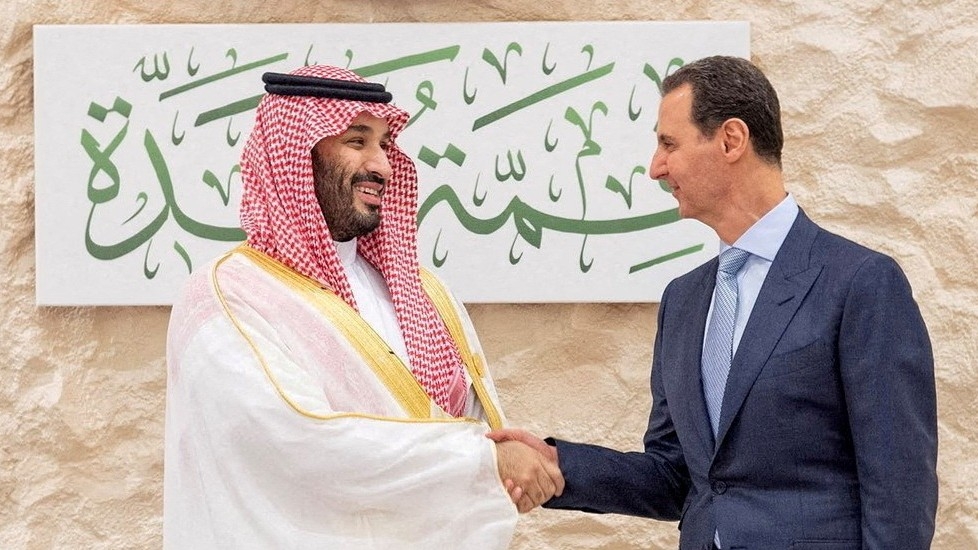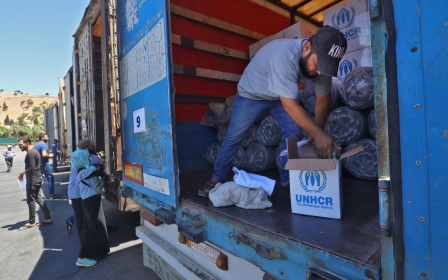New sanctions bill targets US allies normalising Assad government

A pair of US lawmakers aim to counter normalisation with Bashar al-Assad's government with sweeping new legislation, as Syria continues to be welcomed back to the world stage.
Republican Senators Marco Rubio and James Risch introduced the Assad Regime Anti-Normalization Act of 2023 on Wednesday. The bill's rollout comes less than one week after Assad made his first visit to China since his country erupted into civil war 12 years ago.
The bill, a senate version of one introduced in the House of Representatives earlier this year, would extend the current sanctions on Syria, known as the Caesar sanctions, to 2032 and prohibit the US government from normalising relations with Assad.
Assad was accepted back into the Arab League in May, as Saudi Arabia and the UAE, which for years backed groups opposed to his government, pivoted to engaging with Assad. Jordan and Lebanon have reached out to Damascus to address their refugee crisis and the drug trade.
The thaw in ties has put some of Washington's closest Arab partners on opposite sides of bipartisan consensus in Congress, where lawmakers want to keep Assad isolated over his role in a civil war that killed hundreds of thousands of people, and for his closeness to Russia and Iran.
New MEE newsletter: Jerusalem Dispatch
Sign up to get the latest insights and analysis on Israel-Palestine, alongside Turkey Unpacked and other MEE newsletters
"Despite a growing mountain of evidence against Assad for war crimes, there has been a troubling wave of efforts to rehabilitate and whitewash the regime and its crimes," Republican Senator Jim Risch said. "This legislation enforces a policy of diplomatic and economic isolation against the Assad regime."
The bill calls for a "description of steps the US is taking to actively deter recognition" of Assad by other governments including "specific diplomatic engagement and economic sanctions". Unable so far to prevent the steady drumbeat of normalisation, lawmakers want more visibility into what their regional partners are doing.
It contains a provision that calls for the Secretary of State to provide Congress with a list of all meetings - at the ambassador level and above - between Syria and its neighbors, including Qatar, Saudi Arabia, the UAE, Jordan and Turkey.
It also requires a review of all transactions, including donations over $50,000 in areas of Syria held by Assad's government made by anyone in those countries.
Caesar sanctions overcome, Assad says
Despite his outreach, Assad has come out empty-handed from Gulf states and Beijing to begin funding Syria's reconstruction, which the UN estimates will cost around $250bn.
In 2020, the US imposed sanctions on Syria under the Caesar Act, named for a Syrian military photographer who smuggled tens of thousands of gruesome photos out of the country which documented evidence of war crimes.
'We'd be seeing more Gulf state investments [in Syria] now if the sanctions weren't there'
- Aron Lund, Century International
Aron Lund, a fellow at Century International, told Middle East Eye that "we'd be seeing more Gulf state investments now if the sanctions weren't there".
The updated bill expands the sanctions net to members of Syria's parliament, senior officials of the Baath Party and those accused of diverting humanitarian aid.
Critics have accused US President Joe Biden's administration of not vigorously enforcing sanctions against Damascus that are already on the books. Lund said the administration had been "fairly restrained" implementing Caesar sanctions, despite Gulf states' wariness about investing.
"There's a strand of thought in the administration that says Syria doesn't need any more economic pressure right now. They want leverage over Assad, but they don't want the country breaking down and the humanitarian crisis intensifying," Lund said.
In an interview in August, Assad sought to downplay the Caesar Act, saying "we managed in numerous ways to bypass this law", adding that, "the biggest obstacle [to reconstruction] is the image of the war in Syria, which prevents any investment in the Syrian market and economy".
Damascus to Athens direct
Expanding flights to and from Damascus has been one of the most tangible signs that Syria is slowly reconnecting with the world.
Syria's top airlines, Cham Wings and Syrian Arab Airlines, have already been sanctioned by the US, but lawmakers are calling on the Biden administration to impose secondary sanctions "on airport service providers outside of Syria".
Cham Wings has direct flights to Oman, the UAE and Kuwait and indirect flights to Saudi Arabia. Last year, the EU lifted sanctions on Cham. Air Mediterranean, a Greek airline with links to Cham, started direct flights between Athens and Damascus earlier this year.
The lawmakers are also zeroing in on Asma al-Assad, Bashar's wife and an ex-JP Morgan banker, who analysts say yields massive influence over Syria's war-ravaged economy. They are asking for a determination over whether Asma's charity, the Syria Trust for Development, meets the criteria for sanctions under the Caesar Act.
Currency manipulation in focus
While Syria is effectively cut off from doing business with the West, aid has continued to pour into the country, including government-controlled regions. Damascus has long been accused of siphoning off UN aid dollars - the bulk of which comes from the West.
Assad controls about two-thirds of Syrian territory with Moscow and Tehran's backing. He has tried to use aid to exert control over parts of Syria still held by opposition forces. Middle East Eye reported that the Assad government obstructed rescue efforts in the country's rebel-held northwest after a devastating earthquake in February.
A report last year said that "systemic" corruption plagued UN humanitarian aid to Syria. Between 2019 and 2020, nearly 47 percent of UN procurement funding in Syria went to businesses tied to human rights abuses committed by the Assad government. The authors found that Damascus kept 51 cents of every international aid dollar spent in Syria in 2020.
One of the most lucrative schemes for Damascus has been exploiting Syria's currency exchange rate with international donors, experts say.
Syria's currency has collapsed since the war, with the Lira plunging to about 13,000 pounds to one US dollar. Before the war it traded at around 47 pounds to the dollar.
Lawmakers want the Secretary of State to provide an assessment of Damascus' manipulation of the exchange rate.
Middle East Eye delivers independent and unrivalled coverage and analysis of the Middle East, North Africa and beyond. To learn more about republishing this content and the associated fees, please fill out this form. More about MEE can be found here.





